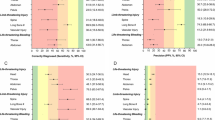Abstract
Clinically important diagnostic errors are relatively common among polytrauma patients (2–40%). Errors are not random; they are more frequent in the spine and periarticular appendicular skeleton, especially in hemodynamically unstable patients who require resuscitation or operative intervention before completion of secondary or tertiary clinical survey. Misleading history, distracting findings, and misjudgments all contribute to risks of diagnostic errors.



Similar content being viewed by others
References
Enderson BL, Reath DB, Meadors J, Dallas W, DeBoo JM, Maull KI (1990) The tertiary trauma survey: a prospective study of missed injury. J Trauma 30:666–669; discussion 669–670
Frawley PA (1993) Missed injuries in the multiply traumatized. Aust NZ J Surg 63:935–939
Buduhan G, McRitchie DI (2000) Missed injuries in patients with multiple trauma. J Trauma 49:600–605
Tait GR, Rowles JM, Kirsh G, Martindale JP, Learmonth DJ (1991) Delayed diagnosis of injuries from the M1 aircraft accident. The Nottingham, Leicester, Derby, Belfast Study Group. Injury 22:475–478
Sommers MS (1995) Missed injuries: a case of trauma hide and seek. AACN Clin Issues 6:187–195
Barendregt WB, de Boer HH, Kubat K (1993) Quality control in fatally injured patients: the value of the necropsy. Eur J Surg 159:9–13
Hirshberg A, Wall MJ Jr, Allen MK, Mattox KL (1994) Causes and patterns of missed injuries in trauma. Am J Surg 168:299–303
Houshian S, Larsen MS, Holm C (2002) Missed injuries in a level I trauma center. J Trauma 52:715–719
Sung CK, Kim KH (1996) Missed injuries in abdominal trauma. J Trauma 41:276–282
Brooks A, Holroyd B, Riley B (2004) Missed injury in major trauma patients. Injury 35:407–410
Voeller GR, Reisser JR, Fabian TC, Kudsk K, Mangiante EC (1990) Blunt diaphragm injuries. A five-year experience. Am Surg 56:28–31
Onuora VC, Patil MG, al-Jasser AN (1993) Missed urological injuries in children with polytrauma. Injury 24:619–621
Bochicchio GV, Napolitano LM, Haan J, Champion H, Scalea T (2001) Incidental pregnancy in trauma patients. J Am Coll Surg 192:566–569
Ferrera PC, Verdile VP, Bartfield JM, Snyder HS, Salluzzo RF (1998) Injuries distracting from intraabdominal injuries after blunt trauma. Am J Emerg Med 16:145–149
Biffl WL, Harrington DT, Cioffi WG (2003) Implementation of a tertiary trauma survey decreases missed injuries. J Trauma 54:38–43; discussion 43–44
Ward WG, Nunley JA (1991) Occult orthopaedic trauma in the multiply injured patient. J Orthop Trauma 5:308–312
Abdel Hadi MS, Al-Mulhim AA, Al-Awad NI, Zakaria HM, Al-Awami MS (2001) Diaphragmatic injury. A clinical review. Saudi Med J 22:890–894
McLauchlan CA, Jones K, Guly HR (1997) Interpretation of trauma radiographs by junior doctors in accident and emergency departments: a cause for concern? J Accid Emerg Med 14:295–298
Berbaum KS, Brandser EA, Franken EA, Dorfman DD, Caldwell RT, Krupinski EA (2001) Gaze dwell times on acute trauma injuries missed because of satisfaction of search. Acad Radiol 8:304–314
Stephan PJ, McCarley MC, O’Keefe GE, Minei JP (2002) 23-Hour observation solely for identification of missed injuries after trauma: is it justified? J Trauma 53:895–900
Rogers LF, Hendrix RW (1990) Evaluating the multiply injured patient radiographically. Orthop Clin North Am 21:437–447
Heinrich SD, Gallagher D, Harris M, Nadell JM (1994) Undiagnosed fractures in severely injured children and young adults. Identification with technetium imaging. J Bone Joint Surg Am 76:561–572
Jhirad R, Boone D (1998) Computed tomography for evaluating blunt abdominal trauma in the low-volume nondesignated trauma center: the procedure of choice? J Trauma 45:64–68
Blackmore CC, Ramsey SD, Mann FA, Deyo RA (1999) Cervical spine screening with CT in trauma patients: a cost-effectiveness analysis. Radiology 212:117–125
Hanson JA, Blackmore CC, Mann FA, Wilson AJ (2000) Cervical spine injury: a clinical decision rule to identify high-risk patients for helical CT screening. AJR Am J Roentgenol 174:713–717
Schenarts PJ, Diaz J, Kaiser C, Carrillo Y, Eddy V, Morris JA Jr (2001) Prospective comparison of admission computed tomographic scan and plain films of the upper cervical spine in trauma patients with altered mental status. J Trauma 51:663–668; discussion 668–669
Trupka A, Waydhas C, Hallfeldt KK, Nast-Kolb D, Pfeifer KJ, Schweiberer L (1997) Value of thoracic computed tomography in the first assessment of severely injured patients with blunt chest trauma: results of a prospective study. J Trauma 43:405–411; discussion 411–412
Malhotra AK, Fabian TC, Katsis SB, Gavant ML, Croce MA (2000) Blunt bowel and mesenteric injuries: the role of screening computed tomography. J Trauma 48:991–998; discussion 998–1000
Poletti PA, Wintermark M, Schnyder P, Becker CD (2002) Traumatic injuries: role of imaging in the management of the polytrauma victim (conservative expectation). Eur Radiol 12:969–978
Bromberg BI, Mazziotti MV, Canter CE, Spray TL, Strauss AW, Foglia RP (1996) Recognition and management of nonpenetrating cardiac trauma in children. J Pediatr 128:536–541
Novelline RA, Rhea JT, Rao PM, Stuk JL (1999) Helical CT in emergency radiology. Radiology 213:321–339
Shima H, Nosaka S, Hayakawa M, Kawaguchi H, Wakabayashi M, Saeki M et al (1997) Diagnostic imaging of renal pedicle injury. Nippon Igaku Hoshasen Gakkai Zasshi 57:5–11
Moore EE, Feliciano DV, Mattox KL (2004) Trauma, 5th edn. McGraw-Hill, New York, p 764
Vazquez WD, Garcia VF (1993) Pediatric pelvic fractures combined with an additional skeletal injury is an indicator of significant injury. Surg Gynecol Obstet 177:468–472
Anderson S, Biros MH, Reardon RF (1996) Delayed diagnosis of thoracolumbar fractures in multiple-trauma patients. Acad Emerg Med 3:832–839
Beaunoyer M, St-Vil D, Lallier M, Blanchard H (2001) Abdominal injuries associated with thoraco-lumbar fractures after motor vehicle collision. J Pediatr Surg 36:760–762
Krueger MA, Green DA, Hoyt D, Garfin SR (1996) Overlooked spine injuries associated with lumbar transverse process fractures. Clin Orthop 327:191–195
Patten RM, Gunberg SR, Brandenburger DK (2000) Frequency and importance of transverse process fractures in the lumbar vertebrae at helical abdominal CT in patients with trauma. Radiology 215:831–834
Author information
Authors and Affiliations
Rights and permissions
About this article
Cite this article
Stanescu, L., Talner, L.B. & Mann, F.A. Diagnostic errors in polytrauma: a structured review of the recent literature. Emerg Radiol 12, 119–123 (2006). https://doi.org/10.1007/s10140-005-0436-x
Received:
Accepted:
Published:
Issue Date:
DOI: https://doi.org/10.1007/s10140-005-0436-x




